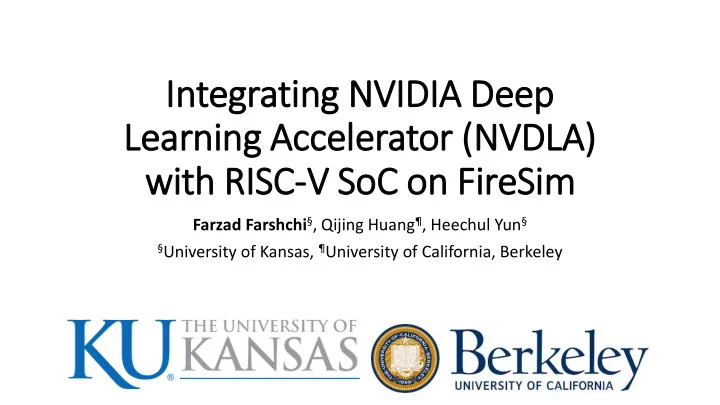

In Integrating NVIDIA Deep Learning Accelerator (NVDLA) wit ith RIS ISC-V SoC on Fir ireSim Farzad Farshchi § , Qijing Huang ¶ , Heechul Yun § § University of Kansas, ¶ University of California, Berkeley
SiFive Internship Rocket Chip SoC NVDLA + • Rocket Chip : open-source RISC-V SoC • NVDLA : open-source DNN inference engine • Demoed the integration at Hot Chips’18 2
SiFive Internship 3
Motivation • Useful platform for research • Limitations • No L2 • Fast DRAM, slow SoC • Expensive: $7k FPGA board • Let’s integrate NVDLA into FireSim 4
FireSim • Fast, cycle-exact full system simulator, runs on FPGA in the cloud • Simulated design is derived from Rocket Chip RTL • Decouples target from FPGA DRAM • Adds its own DRAM and LLC model • Easy-to-use. Very good documentation. 5
How FireSim Works? • Transforms RTL to target model • Inserts queues at I/O ports of target • Creates a token-based simulator • In each cycle a token is consumed by model • What if token queue is empty? • The model has to wait Figure credit: Donggyu Kim et al. “Strober: Fast and Accurate Stall the target pipeline Sample- Based Energy Simulation for Arbitrary RTL” 6
How to Stall The Target Pipeline? • For Chisel code: • Rocket Chip is written in Chisel • For Verilog (we added): 7
Overall System Architecture • NVDLA is integrated in target • LLC + Memory Model: Not part of the target. Added by FireSim. • Supports multiple models e.g. DDR3, constant latency • Runtime configurable LLC: different set, way, block sizes. No need to rebuild FPGA image 8
Integrate Your Own Accelerator • Any accelerator can be integrated (if it fits inside FPGA) • Develop and test software for your accelerator in Linux environment before having the chip in hand • Get fast and accurate performance results 9
NVDLA • Scalable : nv_small, nv_medium, nv_large • We used nv_large : 2048 MACs • Convolutional core: matrix- matrix multiplication • Post-processing: activation Adopted from “The Nvidia Deep Learning Accelerator”, https://goo.gl/Znyba5 function, pooling, etc. 10
Performance Analysis (I) • Baseline config: • Quad-core Rocket Core , 3.2 GHz • NVDLA : 2048 INT8 MACs, 512 KiB conv. buffer, 3.2 GHz • LLC : Shared 2 MiB, 8-way, 64 B block • DRAM : 4 ranks, 8 banks, FR-FCFS • YOLOv3: 416 x 416 frame, 66 billion operations 11
Performance Analysis (II) • Frame process time: 133 ms ( 7.5 fps ) • 67 ms on NVDLA • 66 ms on processor, multithreaded with OpenMP • Layers not supported by NVDLA are running on processor • Custom YOLO, upsampling, FP ⇔ INT8 • Make common DNN algorithm run very fast ✔ • Computations not supported by the accelerator can make you slow ✖ 12
Performance Comparison • Rocket : baseline config, no NVDLA 5.5x • NVDLA+Rocket : baseline config 407x • Xeon : E5-2658 v3 • Titan Xp : Pascal arch, 3840 CUDA cores • Titan cosumes more power • Titan Xp: board TDP 250 W , 471 mm² in 16nm • NVDLA IP: 766 mW peak, 3.3 mm² in 16nm 13
Sharing LLC with Accelerator • Sharing the LLC can be a good 1.6x alternative to scratchpad • Consumes less chip area • Less programming effort • Performance does not vary by changing the LLC size • But varies by changing the block size • Streaming access pattern. Not much data reuse left * Speedup is measured w.r.t design with no LLC • NVDLA minimum burst length: 32B • Hardware prefetcher should help 14
Contention In Memory System • We care about worst-case 2.5x execution time in real-time systems • Synthetic benchmark is running on the CPU stressing the memory system • NVDLA execution time is measured * Normalized to solo execution time i.e. running in isolation 15
Conclusion • We integrated NVDLA with a RISC-V SoC on FireSim • Fast, easy-to-use • No FPGA board needed: runs on the Amazon could • Can be used for architectural/system research • We will be using it for research in real-time embedded systems • Open-sourced and publicly available at: https://github.com/CSL-KU/firesim-nvdla/ Google “ firesim nvdla ” 16
Demo 17
• Questions? 18
Recommend
More recommend